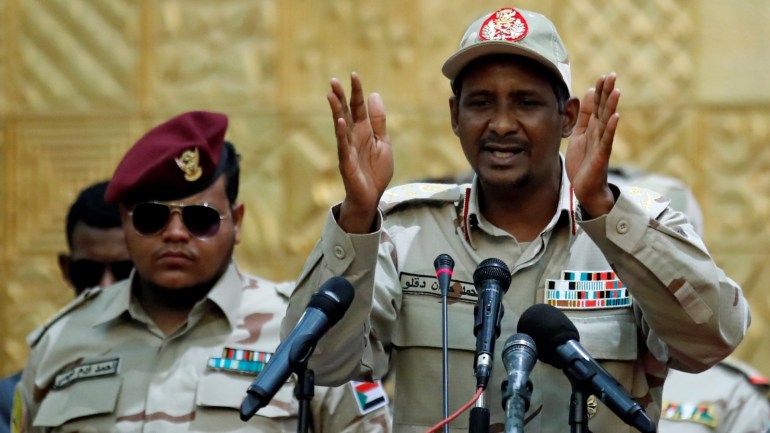Sudanese sources expected a soon relief to the crisis in Sudan after a second meeting between Prime Minister Abdullah Hamdok and Chairman of the Sovereignty Council Abdel Fattah Al-Burhan, which dealt with the existing dispute between the civil and military components, and the continuous closure of vital facilities in the east of the country.
An informed government source told Al Jazeera that Hamdok will brief the civilian component of the transitional government today, Monday, on the results of his meeting with Al-Burhan regarding the crisis between the civilian and military components of the transitional authority.
Hamdok met Al-Burhan yesterday, Sunday, for the second time, after a previous meeting in the past few days, and nothing was nominated from the two meetings, indicating that the two sides had reached solutions regarding the dispute between them.
The government source confirmed that communication between the two components has completely stopped since the outbreak of the crisis following the recent military coup attempt.
Al-Jazeera correspondent Al-Taher Al-Mardi quoted Sudanese sources as saying that they expect the crisis to end soon, considering that it is now having a significant impact on the situation in Sudan.
Al-Mardi stated that there is a willingness from the military component, especially from the head of the Sovereign Council, for dialogue with the Prime Minister in order to come up with clear solutions to this crisis, especially since the closure of Port Sudan port led to a suffocating crisis in Khartoum in terms of basic commodities in parallel with a political suffocation, as things became More complicated after a split occurred in the political incubator of the Forces of Freedom and Change.
Al-Jazeera correspondent indicated that intensive consultations are currently being held to reunite the forces of change and settle this crisis between the civil and military components.
In recent days, a dispute has intensified between civilians and the military over the transfer of the leadership of the transitional phase to the civilian component, and this comes as part of an exchange of accusations between the two parties.
Hemedti's statements come in light of the dispute between civilians and the military in the transitional authority (Reuters)
Sudan rule
The Deputy Chairman of the Sudanese Sovereignty Council, Mohamed Hamdan Hemedti, said that the unity of Sudan will not be compromised, and not an inch of its land will be allowed to be lost, adding that it is enough for what was lost in the past years, as he put it.
Hemedti added, in a speech to a delegation from the Fellata tribe's native administration in Khartoum, that Sudan will be governed by those who are fit.
referendum proposal
Meanwhile, the head of the Supreme Council of Beja Opticals and Independent Amauds in eastern Sudan - Muhammad Al-Amin Turk - described the civilian government as a nightmare, and said that in bringing it down would serve the Sudanese people.
In an interview with a local radio station on Sunday, Turk called for demonstrations to be organized in Khartoum for the sake of justice for eastern Sudan.
He stressed that the current government in its partisan form will not be able to address the issue of the East, and called for the formation of an independent government of competencies that deals with the region without complicating the situation.
The tribal leader suggested that a popular referendum be held in eastern Sudan to cancel or continue the eastern path in the peace agreement.
His statements come with the continued closure of vital facilities in eastern Sudan for more than 3 weeks, which has affected the supply of basic commodities and fuel in some areas, including the capital, Khartoum.
In the context, groups of citizens in the city of Dongola (northern Sudan) prevented the transfer of about 15,000 tons of wheat to Khartoum, which is facing an acute shortage of bread flour.
The Sudanese government says that this wheat is from the state's strategic stockpile located in the city's warehouses.
The residents of Dongola are protesting against the withdrawal of wheat from their city, and are demanding that this be stopped so that their state does not face a crisis in the supply of bread flour.
The Sudanese Minister of Industry had told Al Jazeera that the supply of bread flour in Khartoum was sufficient for one day, and that they had resorted to withdrawing quantities from the strategic stockpile of the central government in the northern state.
worsening conditions
The economic crisis in Khartoum is exacerbated by the continued closure of the roads and ports in the east of the country by the Beja Council to pressure the government to cancel the eastern route in the Juba Peace Agreement.
This crisis resulted in a scarcity of bread flour and a number of basic commodities such as sugar, with a significant increase in prices.
The Sudanese government announced that its stockpile of wheat in Khartoum is sufficient for one day only, and that it is forced to resort to the strategic stockpile located in the north of the country.
arrests
On the other hand, a Sudanese military source told Al Jazeera that the competent authorities arrested last Thursday 4 civilians from the group accused of orchestrating a military coup on September 21.
The source added that the authorities are still pursuing others after information was available about their escape to neighboring countries.
He explained that the number of civilians arrested in the coup attempt amounted to 15 people who are in the detention centers of the Political Security, in preparation for their handing over to the Public Prosecution.
The source indicated that some of the detainees had a relationship with Brigadier General Mohamed Abdel Jalil (Wad Ibrahim), who led a coup attempt against President Al-Bashir in 2003, and disappeared from view after the revolution.

